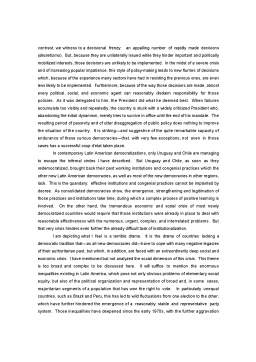Extras din curs
Guillermo O’Donnell is Helen Kellogg Professor of International Studies, and Academic
Director of the Helen Kellogg Institute for International Studies.
The present work was done in the framework of the project “East-South System Transformation,”
directed by Adam Przeworski. Research for this paper was supported by general research funds
of the Kellogg Institute, as well as by grants from the Ford Foundation and the International
Development Research Centre to the “Grupo de Estudos Políticos” of CEBRAP, Brazil. This
support is gratefully acknowledged.
The pages that follow are a partial and preliminary product of research I am undertaking (a revised
version will become part of a book I am writing). Several themes I can only allude here are
discussed in "On the State, Democratization and Some Conceptual Problems (A Latin American
View with Glances at Some Post-Communist Countries), forthcoming in World Development,
September 1993, and pre-published as Kellogg Institute Working Paper #192 (April 1993).
ABSTRACT
This paper presents a first result of ongoing research on emerging forms of democracy. The
author argues that it may be necessary to conceptualize a new type of “delegative” democracy, as
different in some crucial respects from the “representative” democracy that has been theorized in
the existing literature. The emergence and workings of delegative democracy are seen as closely
interwoven with the deep social and economic crisis that some newly democratized countries are
undergoing. But those relationships remain to be worked out by research in progress.
Preliminaries
Here I depict a “new animal,” a subtype of existing democracies, which has yet to be
theorized. As often happens, the similitudes of this one with other, already recognized animals
are many, with some cases shading off between the former and some variety of the latter. Still, I
have convinced myself that the differences are significant enough to attempt such a depiction.
Second, the drawing of neater boundaries between those types depends on empirical and, also,
on more refined analytical work I am in the midst of. Third, if this is really a new animal (and not a
member of an already recognized family, or a form too evanescent to merit conceptualization),
sorting out its relationships with other factors—what is cause, or effect, or mere correlation—is the
way to make the whole exercise of interest. As the reader will see in the pages that follow, in
these respects many of my opinions are tentative, and I do not try to disentangle several causal
relationships that are entailed in the argument.
In papers, meetings, and discussions those of us who have worked on transitions and
democratic consolidation have repeatedly said that, since it would obviously be wrong to assume
equifinality of those processes, we need a typology of democracies. Some important efforts have
been made,1 focused on the consequences, in terms of types of democracy and policy patterns,
of various paths to democratization. But, contrary to what I expected to find, my ongoing work
suggests that the more decisive factors for generating various kinds of democracy are not those
related to the characteristics of the process of transition from authoritarian rule. On one hand,
longer-term historical factors and, on the other, the degree of severity of the socioeconomic crisis
newly installed democratic governments may inherit, seem more important.
The main points of my argument are: 1) Existing theories and typologies of democracy
refer to representative democracy as practiced, with all its variations and subtypes, by developed
capitalist countries. 2) Some newly installed democracies (Argentina, Brazil, Peru, Ecuador, and
Bolivia, plus the Philippines and Korea, some Central and Eastern European countries, and—at
best—many of the countries emerged of the dissolution of the Soviet Union) are democracies, in
the sense that they meet Robert Dahl’s criteria for the definition of polyarchy.2 3) But these
democracies are not—nor seem to be moving toward—representative democracy; they present a
set of characteristics which tempts me to call them delegative democracies (DD). 4) DDs are
neither consolidated nor institutionalized democracies, but they may be enduring; in many cases,
no imminent threat of an open authoritarian regression, nor advances toward institutionalized
1 Karl, Terry Lynn and Schmitter, Philippe C., “Modes of Transition and Types of Democracy in
Latin America, Southern & Eastern Europe,” International Social Science Journal, 128 (May
1991) pp. 269-284.
2 Dahl, Robert, Polyarchy. Participation and Opposition (New Haven: Yale University Press,
1971) and Democracy and Its Critics (New Haven: Yale University Press, 1989).
representativeness, are in sight. 5) Finally, I argue that we see the effect of an important
interaction: the deep social and economic crisis that most of these countries inherited from their
authoritarian predecessors powerfully multiplies the consequences of certain conceptions and
practices that lead in the direction of delegative, not representative democracy.
Preview document
Conținut arhivă zip
- Delegative Democracy.pdf




























